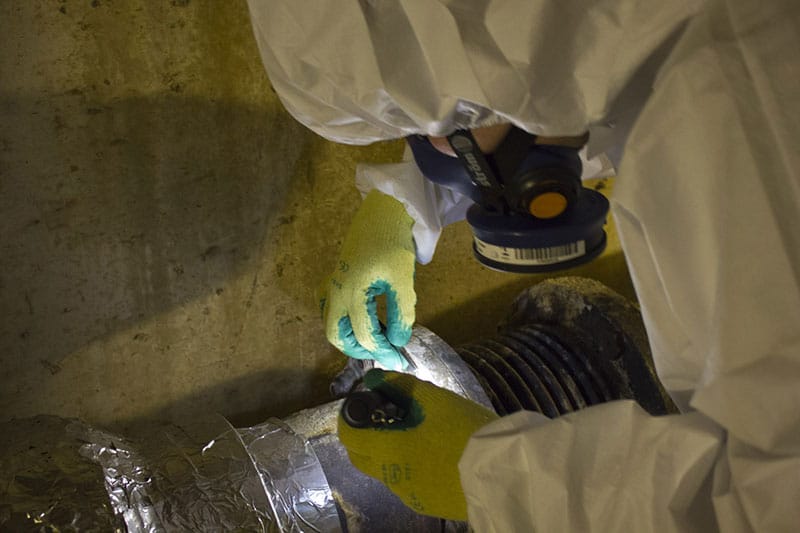What skills and qualifications do I need for a job as an asbestos surveyor?
While the UK banned the use of asbestos in 1999, it continues to exist in buildings constructed before that year. There are so many public and private buildings that contain asbestos. That’s why surveying is necessary to prevent dangerous exposure events. Without proper management, damaged asbestos-containing materials (ACMs) can release microscopic fibres. When inhaled, they can cause life-threatening diseases years in the future.
According to the Control of Asbestos Regulations 2012, the duty holder of a property is responsible for asbestos management on the property. However, having this responsibility doesn’t make every duty holder an expert. Many don’t feel they’re capable of making decisions about asbestos. This is when there’s a need for asbestos surveyors.
Asbestos surveyors are able to identify, analyse, and monitor the ACMs on a site. After inspecting the premises for asbestos, samples will be taken. They’ll then be analysed in a laboratory. The inspector will deliver their findings to the duty holder so they can make informed decisions.

What qualifications and training are needed to be an asbestos surveyor?
There are a few different options to consider if you’re interested in becoming an asbestos surveyor. You can start with university training, or you can go straight to receiving the necessary certification.
Academic qualifications and degrees relevant to asbestos surveying
You can opt to begin your surveyor training by pursuing a university degree. A great start is studying in a field like construction management or civil engineering. Once you’ve earned your degree, you can enrol in specialist training for asbestos surveying.
Another path is to take a course that will give you a Level 3 Award in asbestos surveying. Follow that with getting a Level 4 Certificate in asbestos laboratory management.
Note that completing a university program or college course is not the only step to take. You’ll still need the proper certifications to become an asbestos surveyor. We go over the two industry-recognised certifications below. You’ll need to complete one of them.
While having an academic background in surveying isn’t the fastest option for this career path, it is thorough. You’ll learn about every aspect of surveying. You can then use that education to inform your asbestos surveying training.
Vocational training programs and certifications for asbestos surveyors
Whether you start with college-level training or not, you’ll need to achieve one of the following certifications:
Royal Society for Public Health (RSPH) Level 3 Award in Asbestos Surveying
According to the RSPH website, the Level 3 Award gives potential asbestos surveyors the “knowledge to inspect buildings and premises for asbestos and to advise on how to manage any asbestos found.” The program is divided into four units. They cover everything from asbestos types and health effects to managing asbestos in buildings, sampling asbestos in bulk, and asbestos contamination.
The P402 Surveying and Sampling Strategies for Asbestos in Buildings qualification from the British Occupational Hygiene Society (BOHS)
According to the BOHS website, this qualification “gives surveyors the requisite background knowledge and practical skills to identify and safely survey buildings for asbestos.” It’s made up of 18 hours of study time. Those hours are divided between teaching, assessments, and independent study. Students will learn about the different uses of asbestos, survey types, bulk sampling, and more.
Our suggested strategy for becoming an asbestos surveyor
If you’re not able to begin at the university level, our best advice is to first gain one of the two certifications we covered above. From there, complete an apprenticeship with an asbestos surveying company. Following completion, you can continue with on-the-job experience and training.
What skills does an asbestos surveyor need to possess?
One of the best skills an asbestos surveyor can possess is integrity. This job requires that you have respect for asbestos materials and have a deep grasp of its very real dangers.
You are also expected to comply 100% with legal requirements. Asbestos management is a serious matter. Clients want to know that you have their best interests in mind.
There are a lot of job duties that an asbestos surveyor will carry out. These include:
- Analysing building plans and technical drawings to determine where asbestos may be present.
- Following safety precautions while inspecting a property for asbestos.
- Understanding the health risks of asbestos and how to keep yourself, other workers, and the public safe.
- Compiling comprehensive reports based on the survey’s findings.
- Disposing of asbestos-contaminated samples and other items.
That’s only a portion of what asbestos surveyors do. To perform their job well, asbestos surveyors need a number of hard and soft skills. Those include the following:
Technical knowledge and expertise
Technical knowledge and expertise skills for an asbestos surveyor include:
- Understanding of ACMs and their identification
- Familiarity with various building materials and their potential for asbestos presence
- Proficiency in using specialised equipment for sampling and analysis
Knowing where to look for ACMs and how to identify them is imperative to conduct a thorough survey.
Safety and health competence
Safety and health skills for an asbestos surveyor include:
- Knowledge of occupational health and safety regulations related to asbestos
- Understanding of personal protective equipment (PPE) and its proper use
- Ability to assess and mitigate risks associated with asbestos exposure
- Environmental awareness about asbestos pollution and prevention methods
Asbestos surveyors have to safely carry out their job while also offering guidance to duty holders about how to keep themselves and anyone on the premises safe.
Attention to detail and analytical skills
Detail-oriented and analytical skills for an asbestos surveyor include:
- Ability to conduct thorough inspections and identify potential ACMs
- Attention to detail in collecting accurate samples and documenting findings
- Analytical skills to interpret laboratory results and assess asbestos risks
- Fast decision-making skills to avoid asbestos exposure events
Every asbestos surveying job is different. The best asbestos surveyors are extremely detail-oriented. They’re also comfortable making high-level decisions quickly so that everyone stays safe.
It’s not uncommon to come across damaged ACMs and dangerous exposure potential while on the job. This will require you to make on-the-spot decisions about how to handle the situation.
Communication and reporting abilities
Communication and reporting skills for an asbestos surveyor include:
- Effective written and verbal communication skills
- Ability to convey complex technical information to clients and stakeholders
- Proficiency in preparing clear and concise reports
Asbestos surveyors have to provide thorough reports on their findings. They also make recommendations for the next actions to be taken. Clearly communicating this to clients is vital to the proper steps being taken.
Note that you don’t have to have a particularly outgoing personality to effectively do this job. However, you do need to be able to explain the situation to clients in a way they can understand. This includes taking into account that they won’t have the same expert-level knowledge that you have.
Legal and regulatory knowledge
Legal and regulatory skills for an asbestos surveyor include:
- Understanding relevant asbestos laws, regulations, and industry standards
- Knowing building legislation for the property being surveyed
- Compliance with asbestos management guidelines and procedures
It’s also important to conduct yourself in a professional manner. You must impartially fulfil the legal requirements for asbestos surveying.
Professional experience and continuous learning
Skills related to professional experience and continuing education for an asbestos surveyor include:
- Proper educational background of qualifications to practise as an asbestos surveyor
- Practical experience in conducting asbestos surveys
- Continuous professional development to stay updated with industry advancements
Asbestos surveyors should stay on top of the industry. This way, you’ll know about any new asbestos-related findings, technologies, or surveying methods.
Collaborative and teamwork skills
Collaborative and teamwork skills for an asbestos surveyor include:
- The ability to work collaboratively with clients, contractors, and other professionals
- Coordination and teamwork in multidisciplinary asbestos management projects
- Communication skills to clearly explain details to your clients
Rarely is an asbestos surveying project a one-person job. It’s important to be a team player and a strong communicator so the end goal can be achieved.
Final thoughts
Managing asbestos is an essential job to keep the public safe. To become an asbestos surveyor, the relevant educational background or certifications are required. An apprenticeship or another type of on-the-job training can also go a long way to helping you grow in your career.
There are a lot of skills that asbestos surveyors need to possess. These include having technical, safety, and legal knowledge. It’s also important to communicate well and work collaboratively with others. Many successful asbestos surveyors also have an interest in continuously learning and expanding their expertise.

Written by Mark Carter
Mark Carter is a renowned expert in asbestos management, offering clients vital guidance on compliance and safety. His expertise is invaluable for navigating asbestos regulations, ensuring both safety and legal adherence. Mark's role is central in providing effective asbestos-related solutions, helping clients achieve their business objectives with an emphasis on regulatory compliance and safety in asbestos management.
